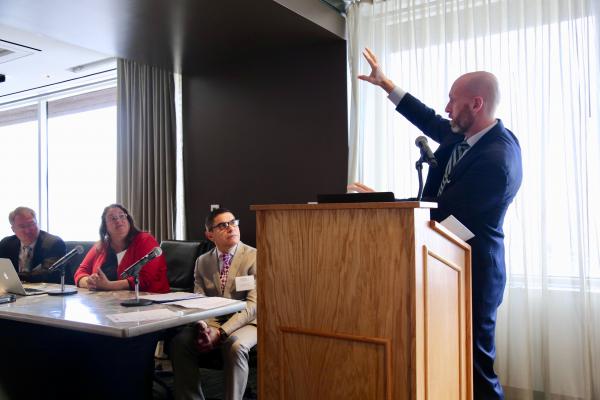Measuring School Climate in Massachusetts

The Rennie Center’s Chad d’Entremont moderates a panel during the December 11 Measuring School Climate event at the UMass Club in Boston. Panelists from left to right: V. Scott Solberg of Boston University, Ann Marie Carpenter of Pittsfield Public Schools, and Amalio Nieves of Boston Public Schools.
We know the impact a child’s home environment has on their development. Feeling safe, supported, stimulated, and connected to family members is critical to healthy growth. Given that most children spend close to seven hours of their day in school, that environment can be just as important. Schools where students feel safe, supported, connected, and engaged are vital to their overall development and ability to learn.
A positive school environment—known as school climate—is linked to increased academic achievement, higher attendance, better psychological health, and lower rates of aggression. Fostering positive school culture starts with understanding how students feel about their learning environment.
The federal Every Student Succeeds Act recognizes the importance of measuring school climate and has given states the opportunity to include this and other nonacademic indicators in their measures of school performance.
But how do you best measure school climate? We teamed up with our partners in the Massachusetts Institute for College and Career Readiness—Boston University and MassINC—as well as Boston College and the Department of Elementary and Secondary Education (DESE) on an event aimed at answering that question.
More than 150 education leaders, policy-makers, and educators gathered at the University of Massachusetts Club in Boston on December 11 to discuss ways to measure school climate.
Cliff Chuang and Carrie Conaway of DESE spoke about the state’s commitment to improving school climate. DESE has started to collect information on students’ social-emotional learning, health, and safety by piloting a voluntary school climate survey following the 2017 MCAS exam. The survey, which included questions on engagement, safety, and environment, found that most students reported positive school environments, especially regarding their relationships with teachers. Districts and schools received individual reports of their findings.
"We are very excited to inform our efforts to support social-emotional learning, health, and safety in our schools with this new climate data, particularly for students most in need of additional support,” said Chuang.
Anastasia Raczek, Associate Director of Evaluation & Research at Boston College’s City Connects, presented research on the importance of school climate and how data collected can be used to improve schools.
"School climate impacts learning, including students' social-emotional development and academic outcomes,” said Raczek. “Measuring school climate helps educators to identify school needs, set goals, and track progress toward improvement. When measured over time, school climate data can be used as a tool to track progress toward goals and eventually shape the kind of school you want yours to be."
The event also included a panel discussion with Ann Marie Carpenter of Pittsfield Public Schools, Amalio Nieves of Boston Public Schools, and V. Scott Solberg of Boston University on how school climate data can be put into action in schools. Since 2009, Boston Public Schools has used voluntary annual school climate surveys with questions on school safety, feelings of acceptance, and teacher effectiveness. Pittsfield Public Schools has district-wide surveys for students and educators, which have been used to inform action plans in schools and the district.
“It’s crucial to bridge the gap between the data we are collecting and the actionable steps districts can take to make sure every student is graduating college and career ready,” said Solberg. “In additional to helping districts measure school climate, we also need to help them develop a whole-school approach to address challenges in school climate.”
To learn more check out the research brief we produced with Boston College on Understanding School Climate and Measurement.
